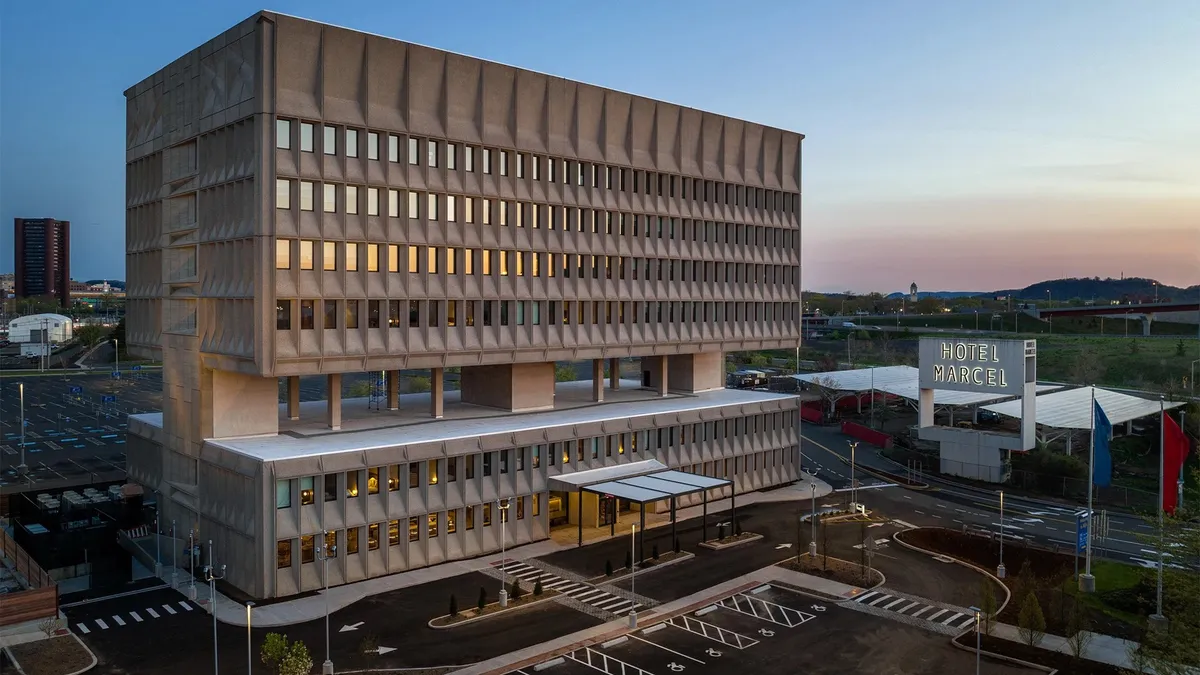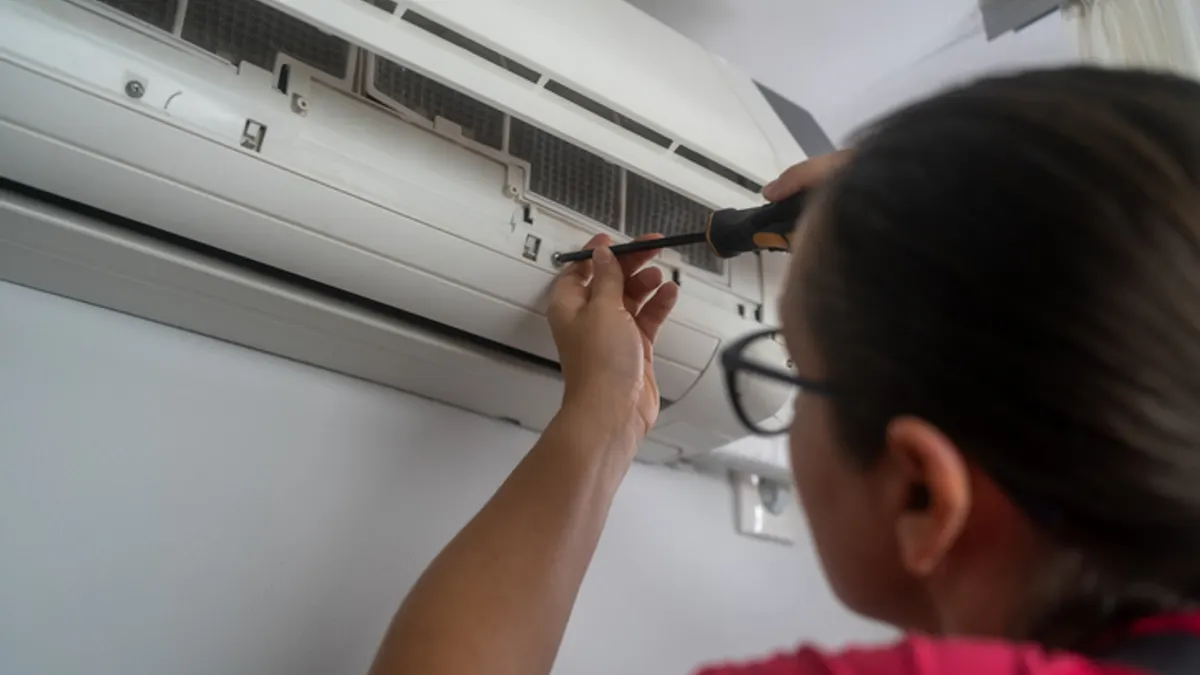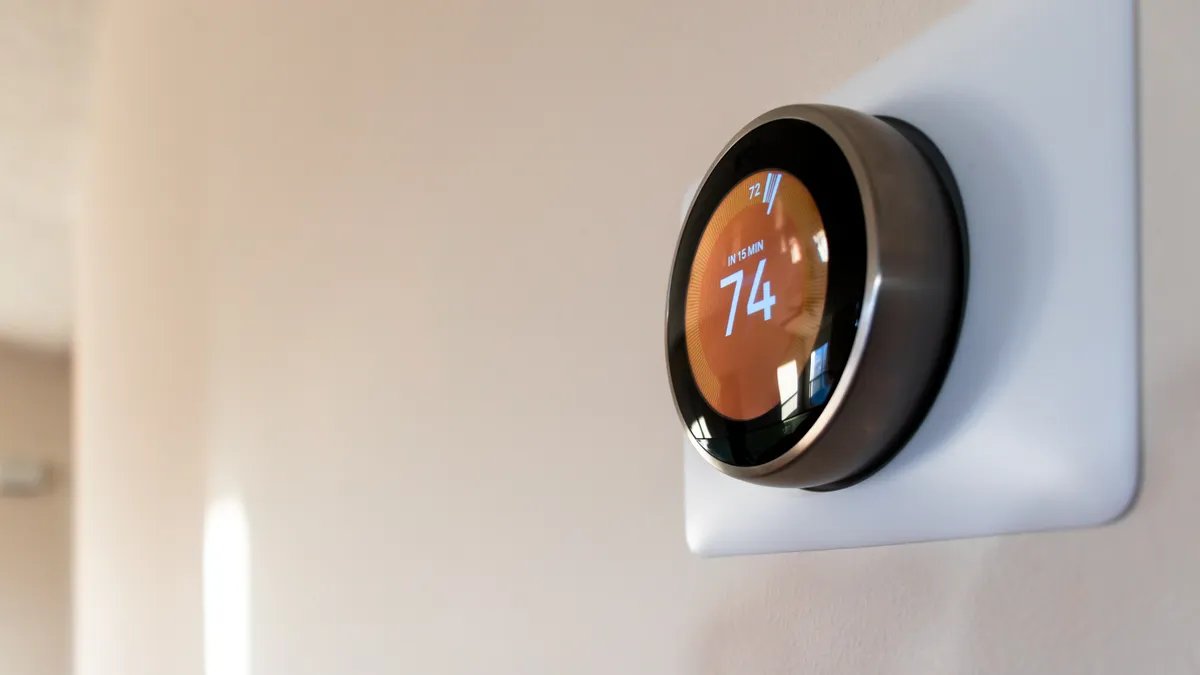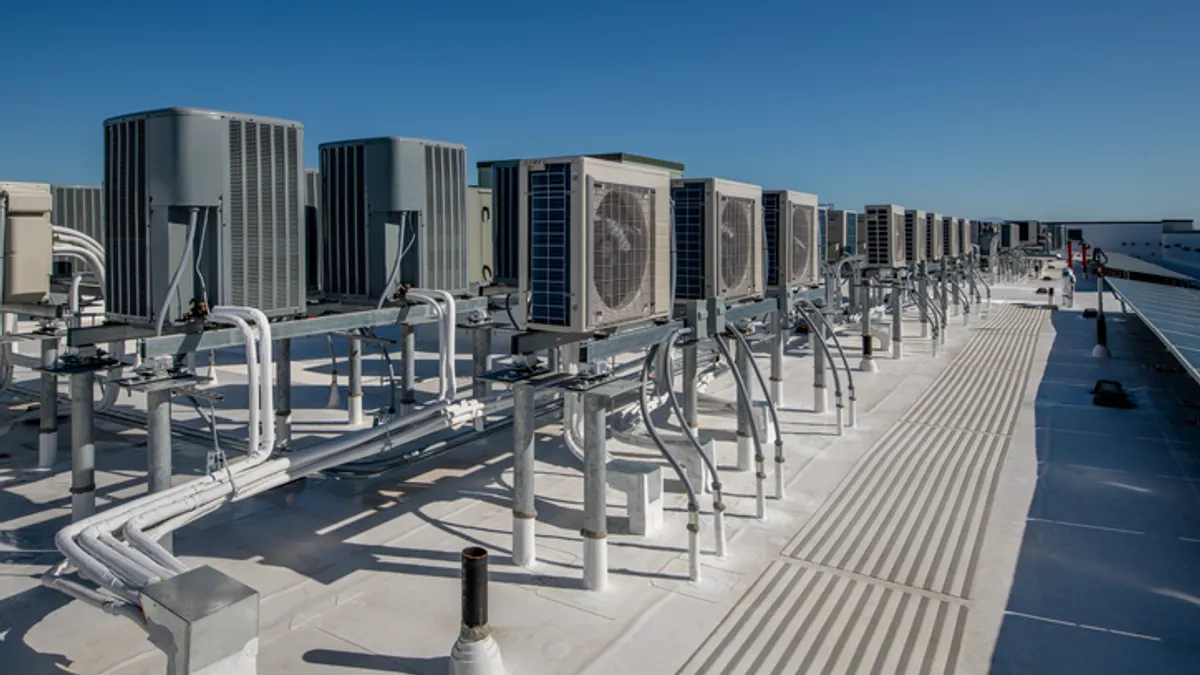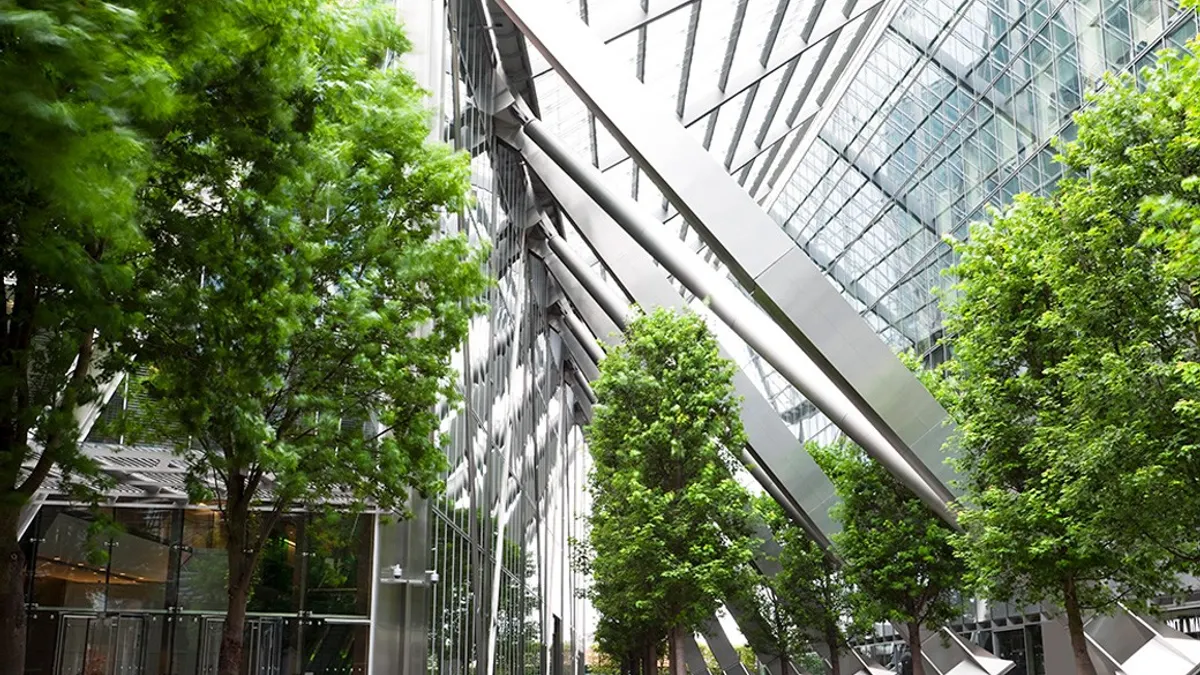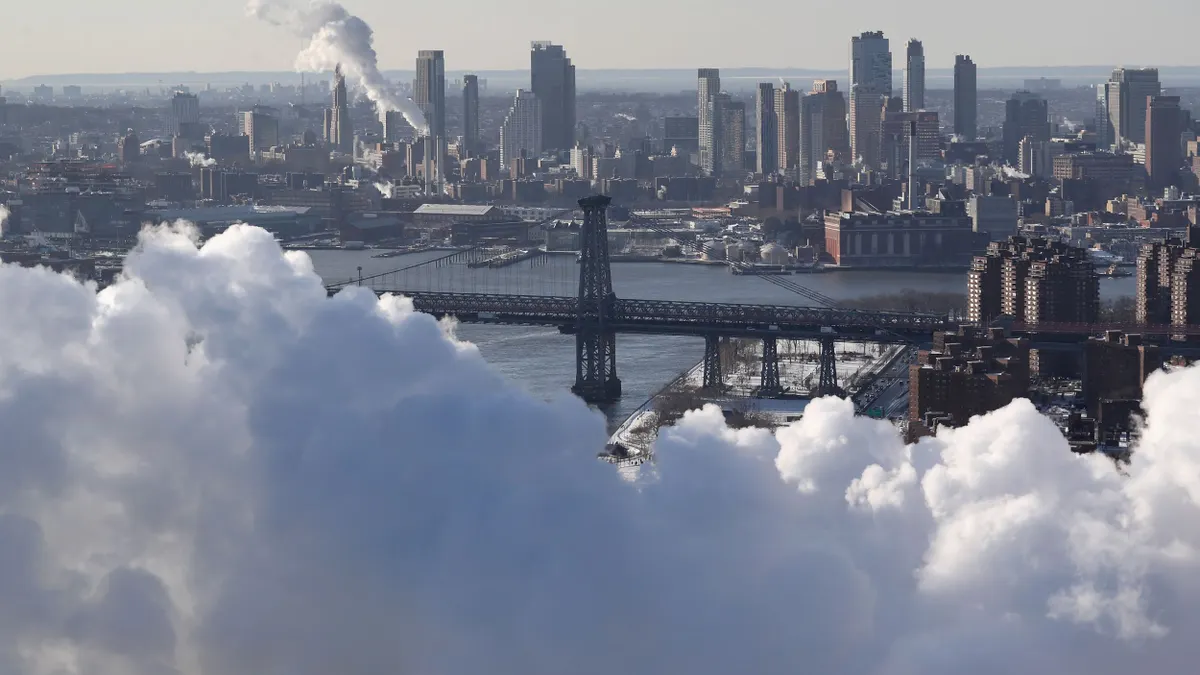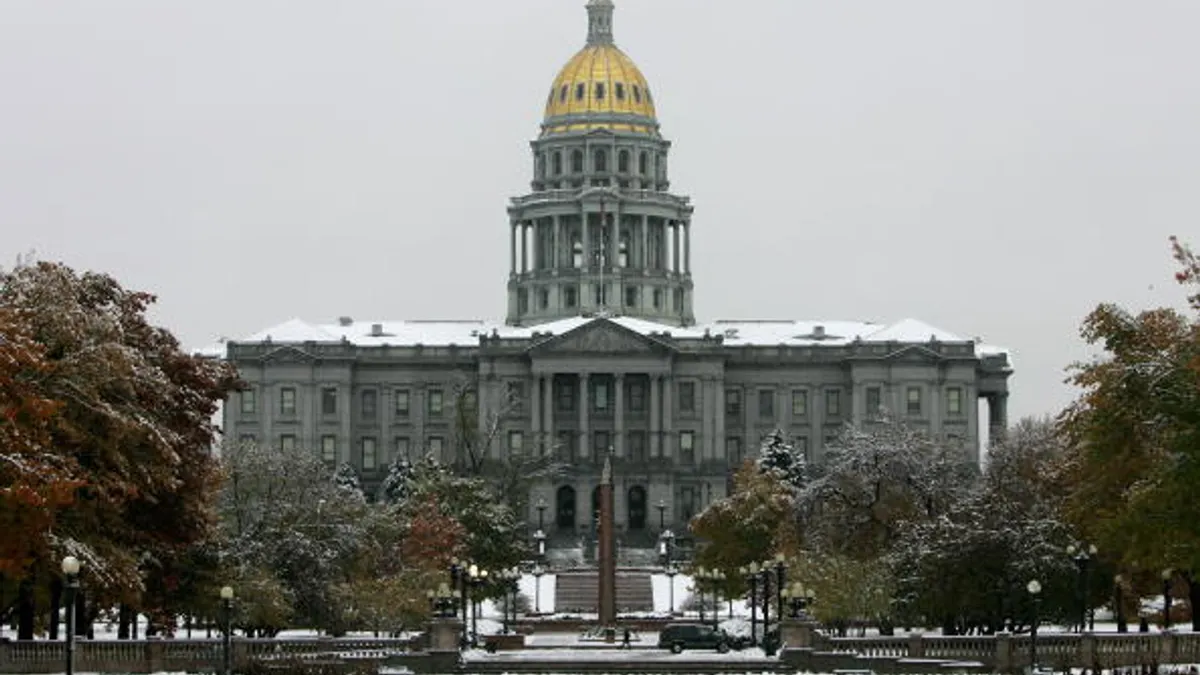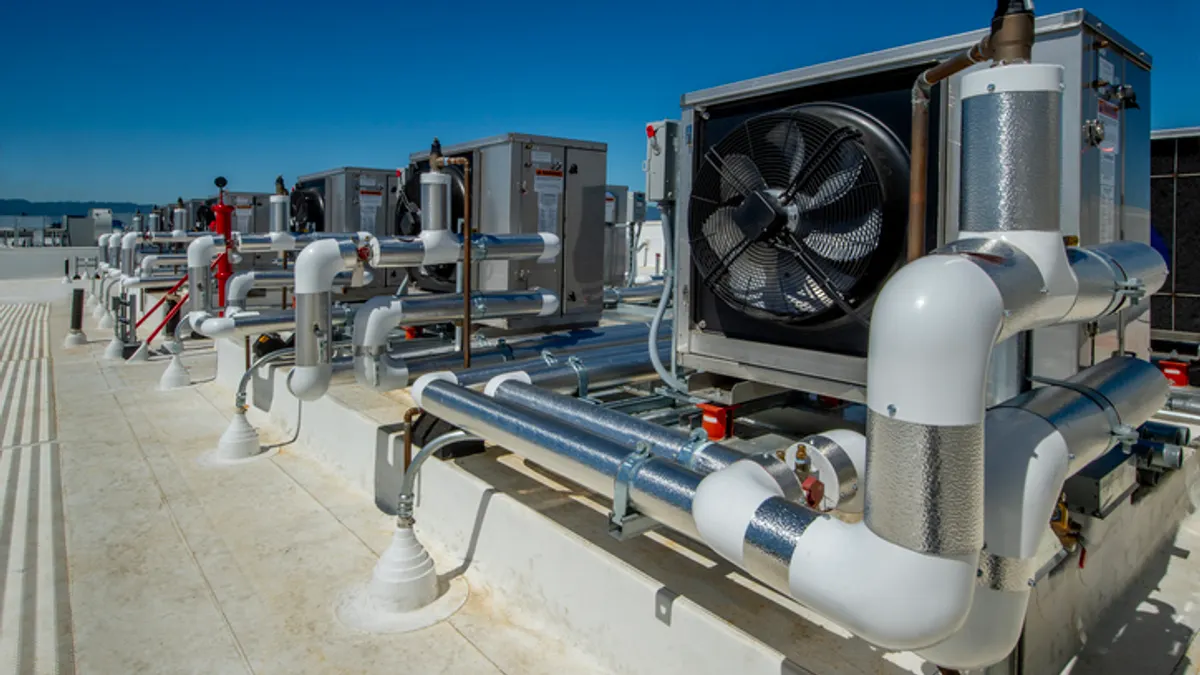The former headquarters of the Armstrong Rubber Company, a concrete-clad Brutalist structure near downtown New Haven, Connecticut, looks at first glance like any other aging office building.
Inside, it’s anything but. The current occupant is Hotel Marcel, a Tapestry Collection by Hilton property, and the United States’ first and only Passive House-certified hotel.
There are only 31 Passive House-certified hotels in the world, according to the International Passive House Association. Certified Passive House buildings require far less energy to heat and cool than conventional buildings, and IPHA sets rigid standards for annual heating and cooling loads, energy demand from domestic appliances, airtightness and annual indoor temperature range.
But Hotel Marcel goes even further. It has no gas hookup and runs entirely on electricity, much of it generated by 1,100 on-site solar panels and the remainder guaranteed 100% emissions-free by the local utility. It boasts 24 electric vehicle charging stalls, including 12 high-speed Tesla Superchargers, and a fleet of all-electric shuttle vans to whisk guests to and from a bustling Amtrak station less than a mile away.
Running the country’s first zero-emissions hotel “has been something else,” Hotel Marcel General Manager Ben Webster said. “I don’t think we fully understood [how special it would be] to offer a high-end hotel experience without any fossil fuels.”
Now, two years after Hotel Marcel’s May 2022 opening, Webster believes the property is proof that ambitious sustainability goals are entirely achievable for hospitality developers and operators.
Dreaming up a fossil fuel-free hotel
Named for Brutalist architect Marcel Breuer, the building’s original designer, Hotel Marcel was a labor of love for developer and owner Bruce Becker.
I don’t think we fully understood [how special it would be] to offer a high-end hotel experience without any fossil fuels.

Ben Webster
Hotel Marcel's general manager
Above all else, Becker — an architect himself — wanted to preserve the distinctive structure, which sat mostly vacant for nearly 20 years before he bought it in 2019.
Becker intended to leverage years of experience designing and developing low-impact residential and “industrial-type” projects to create the most sustainable hotel possible, but it wasn’t clear at first that an all-electric property was doable, Webster said.
Water heating was the biggest early challenge for the 165-room hotel. Fortunately, Mitsubishi Electric Trane HVAC US’s Heat2O commercial heat pump water heater was just hitting the market, making it feasible to supply electrically heated water for 165 rooms, the hotel restaurant and an on-site laundry facility, Webster said.
“Once [Becker] solved the water heating problem, everything else fell into place” in terms of eliminating fossil fuels, Webster said. The on-site laundry is entirely electric, as is the restaurant kitchen — confounding at least one service technician who instinctively asked how to shut off the gas before getting to work, Webster said.
Becker wanted to make it easier for Hotel Marcel guests to burn nothing in transit, too — an option more hotel guests desire. The hotel’s 12 Level 2 chargers run through an on-site microgrid, taking solar power or stored energy from a 1.5-megawatt-hour battery system whenever possible. Today, Hotel Marcel sees 15 to 20 Level 2 charging sessions each day and about 2,000 Supercharger sessions per month, Webster said.
Becker funded the project in part through sustainable tax incentives and loan programs, including a 30% federal tax credit on the solar panels and battery system, a grant from the local utility and financing from the federal CPACE loan program, he told Yale Insights.
In the end, the development team “invest[ed] $3 million less than we would’ve had to raise for a conventional project,” and the hotel now spends about two-thirds less on energy per occupied room night than the typical New England hotel, Becker said.
‘We inherited good bones’
Turning a 50-year-old office building into one of the country’s most energy-efficient hotels brought its share of unexpected challenges, Webster said. Seemingly straightforward tasks turned out to be expensive and time-consuming, like retrofitting the lobby lighting to run on lower-voltage direct current without removing the historical fixtures.
But the renovation also presented opportunities. The ninth floor used to be “all mechanicals,” but Hotel Marcel’s modern HVAC infrastructure takes up only a quarter of the space, Webster said. The balance is occupied by about 7,000 square feet of meeting space.
Hotel Marcel’s distinctive architecture helped, too. Breuer oriented the building’s deep-set window wells to absorb the sun’s energy in winter and cast shadows in summer, reducing heating and cooling demand, Webster said. “That was an original design choice that really helps now.”
Likewise, Hotel Marcel’s concrete walls and panels were easier to air-seal than some other types of wall systems, enabling further reductions in climate-control demand, Becker told Dezeen in 2022.
And the concrete frame was robust enough to accommodate uses Breuer couldn’t have imagined, like supporting a “very heavy” battery system, Webster said.
“We inherited good bones,” he added.
Sustainable hotel development 101
Building efficiency experts are impressed by the end result.
“It’s amazing that [Hotel Marcel was] able to get to zero emissions on an existing building,” said Paul Torcellini, principal engineer for the National Renewable Energy Laboratory’s commercial buildings research group.
Adaptive reuse projects like Hotel Marcel tend to be environmentally friendly upfront because they preserve the “embodied carbon” in existing buildings’ concrete, steel and other materials, Torcellini said. But if a building remains an “energy hog” after the renovation, “operational carbon becomes a big driver” of the project’s total carbon footprint, he said.
An 80% shift to carbon-free energy is better than no shift.

Paul Torcellini
principal engineer for the National Renewable Energy Laboratory’s commercial buildings research group
Building operations account for 28% of global energy-related carbon emissions, with building materials contributing another 11%, according to the World Green Building Council.
Torcellini advises sustainably minded hotel developers and operators to prioritize energy efficiency before thinking about on-site renewables or power purchase agreements for clean energy generated offsite. “The first thing is always to get your [energy] load as low as it can go,” he said.
The path to minimizing a new hotel’s load depends on site-specific factors, starting with whether the project is adaptive reuse or a ground-up development, as well as major systems’ type and size, Torcellini said.
For example, Torcellini said, a hotel in a mild-winter climate “can probably cut 60% to 70% of its heading energy demand” by switching to packaged terminal air-source heat pumps. In a colder climate, a ground-source or groundwater-source heat pump system might be a better choice, Torcellini said.
And though Hotel Marcel shows it’s possible for a hotel in a colder climate to go all-electric, Torcellini said adaptive-reuse developers should consider keeping on-site gas boilers as backup if they’re in good working order. With a heat pump as the primary heat source, the boiler would likely only run on the coldest winter days.
“An 80% shift to carbon-free energy is better than no shift,” Torcellini said.
‘Maybe we’re antiquated 10 years from now’
Going fossil fuel-free has been good for business at Hotel Marcel, in part because the hotel can confidently market itself to event planners as a lower-impact place to host corporate meetings and trade conferences, Webster said. Many of those event planners work for larger companies that have ambitious sustainability goals of their own, he noted.
But reaching eco-conscious guests through online travel agencies has been more challenging, Webster said. In March, Booking.com discontinued its “Travel Sustainable” program in favor of “third-party sustainability certification,” the OTA said. Booking.com listings now include a label for hotels that have achieved third-party certification, a move the OTA said is meant to encourage broader adoption of sustainability measures.
The problem for Hotel Marcel is that “there are no overarching standards right now” and no widely respected organization saying “this is what [travel] sustainability means,” Webster said. That means ahead-of-the-curve properties like Hotel Marcel get lumped into a much larger category of properties doing more conventional sustainability, like eliminating plastic packaging and single-use toiletries.
“Maybe we’re antiquated in 10 years,” Webster said. “We’re just happy to kickstart [the zero-emissions hotel movement] and see where it goes.”
Hotel Marcel aims to stay on the cutting edge of sustainability, though. After meeting its initial goal of running on 100% renewable energy without using carbon offsets, it’s looking for ways to further reduce its impact and eventually generate enough energy on-site to match or exceed its needs, Webster said.
The hotel recently swapped its electric resistance dryers for new Electrolux heat-pump machines that consume 85% less electricity, signed a purchase agreement for new electric bikes and plans further HVAC refinements to drive down energy consumption, Webster said. Longer-term plans include an on-site wind turbine and indoor garden to expand its restaurant’s local sourcing program.
“We want to continue to be a laboratory, to continue to find ways to reduce emissions,” Webster said.


